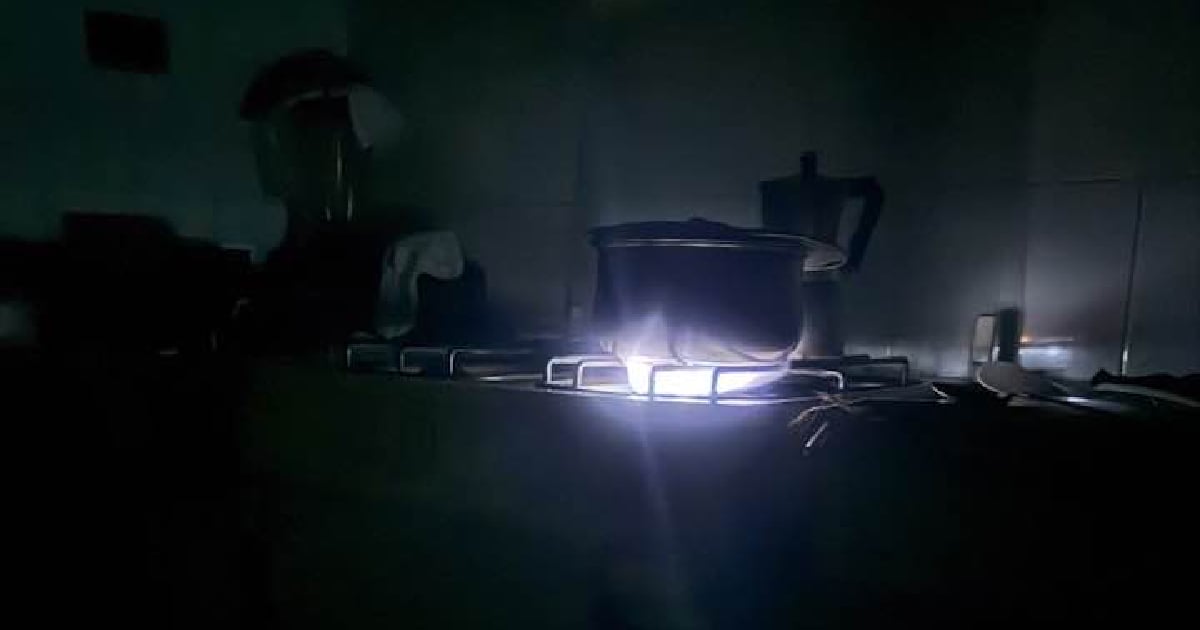The ongoing struggle of millions of Cubans, deprived of basic necessities, is increasingly being highlighted through virtual platforms. Here, both ordinary citizens and notable figures in Cuban society are raising their voices against the stifling reality that threatens to drain the life out of them. Father Lester Rafael Zayas Díaz, a priest at the Church of the Holy Trinity in Sancti Spíritus province, recently shared a poignant reflection that captures the dire circumstances faced by the Cuban people.
"As I was preparing my soup in the darkness, illuminated only by the light of the gas stove, I pondered: what about those without gas? Those without soup? Those who can't capture this audacious moment of cooking amid nothingness because they lack a phone? Those without water? Without a voice? And those who live in fear?" questioned the priest. His words highlighted the severe shortages faced by the defenseless, resource-lacking population during Cuba's worst crisis, while fear of repression stifles free expression.
"No, I don't consider myself privileged under the light of this stove as my soup boils. I feel instead part of a vast silence and deep pain that is killing us," the priest confessed. His meditation was a stark reminder of the hardships plaguing Cubans today: food scarcity, continuous blackouts, lack of water and cooking fuel, and a shortage of medicines and quality healthcare.
His powerful words resonated with many, eliciting responses that echoed his concerns. "And what about those who have nothing? Here, nobody has anything—obviously, the people. We've been deprived of life, the very first thing we lack," underscored one woman. Another lamented, "I ask those questions too. People are dying." A third added, "We're all dying, even those who have a bit more. The struggle for survival exhausts us."
Hope Amidst Despair
Despite the grim situation, some hold onto hope that Cuba's era of hardship will eventually end. Two men optimistically declared, "The night will not last forever."
Father Zayas, who served until July at the Sacred Heart of Jesus Parish in Vedado, Havana, has spoken out against repeated thefts and vandalism at the church, likely intended to intimidate him due to his outspoken criticism of the country's issues and the hardships faced by its citizens. In 2021, he was among 15 Catholic priests who signed a petition against repression before the Civic March for Change organized for November 15 by the Archipelago platform. He has been monitored by state security as one of the church's critical voices.
During his Christmas Eve homily on December 24, 2023, he made it clear that he is not a "political priest," but felt compelled to address harsh realities in his sermons, as it is within life's realness that God is found. He expressed his struggle with what to say to a people living in darkness and despair. "I confess, perhaps this homily is the hardest one to deliver since I began my priestly ministry. What can be said to a hopeless people, in the light of the Gospel of Jesus Christ?" he pondered.
"Reality hurts us, it weighs on us; what lies before us is challenging. (...) God came to a world in crisis and continues to come to a world in crisis. Crises make us strong, they lead us to value what is truly essential," he emphasized.
Nearly a year after the priest's impassioned homily, Cuba's crisis has reached alarming heights, impacting every facet of daily life. From ongoing, prolonged blackouts—better described as "light-ons"—to shortages of food, medicine, and even potable water; rampant inflation; rising crime and insecurity; and political repression that stifles free speech, the nation is enduring one of its most severe socioeconomic downturns in decades.
Cubans find themselves trapped in a bleak landscape of misery and hopelessness, with economic and social conditions worsening daily. The government and its leaders remain incapable of providing basic necessities, solving problems, and halting the country's decline. Many have turned to migration as the only escape from their ordeal, leading to the largest exodus in Cuba's history. Today, hundreds of thousands of Cubans seek opportunities in other countries, denied to them by the socialist regime. Meanwhile, any protest voices within the island are swiftly silenced by an illegitimate government clinging to power.
